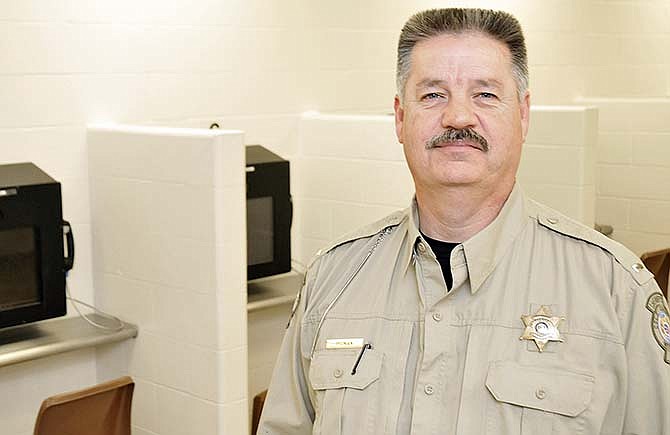Lt. Victor Pitman, 50, is the jail division commander for the Cole County Sheriff's Office. He is also a grandfather, avid reader, artist and caregiver for those neglected by themselves and society.
He said he reads Plato, Harriet Beecher Stowe, Tom Clancy and just about everything Stephen King writes. He used to draw, saying he once sketched the main character from King's book "The Gunslinger." He also reads teen fiction like "The Maze Runner" and "Ender's Game," which he enjoys, but also so he can discuss it with his stepson and grandchild.
But his real hobby, he said, is his job. Pitman enjoys being a law enforcement officer.
Pitman said he intended to join the San Antonio Police Department, but instead applied for the Jefferson City Police Department in 1990 after serving in the U.S. Army. Later, he was asked to help start a police force in Holts Summit.
"I went ahead and took the job with Holts Summit because I figured that it probably rarely happens that you get to start a police department from scratch," Pitman said. "I promised them two years to help them do that and ended up liking the area, so I stayed."
He was there for 18 years before he came to the sheriff's office in 2012.
If you ask him what he does for a living, the first thing he will say is the duties outlined in chapter 221 of the Revised Statutes of Missouri. His response is as organized as his buzz-cut hair and trimmed mustache. But he will then explain his job is to oversee the jail, which he describes as a "community within a community."
"It is kind of like running a business," he said. "It is my job to manage the jail division business for the sheriff and to make sure our staff is trained, that our inmates are maintained and their welfare is maintained, and that we are doing justice with the tax dollars that are provided by the citizens."
He added he and his staff do not control how long inmates stay, nor how they live while there. The officers and courts decide how long people stay in jail, and once they are booked the inmates' behavior determines how the jailers treat them as well as their living conditions.
"We have to make sure that people's basic needs are met, that they are fed, they have clothing, that they have the ability to maintain their hygiene and that they have a clean living environment," he said. "We are not required, like the Department of Corrections, to improve somebody's health, but generally people leave us healthier than how they came to us."
He explained that health improvement can be from multiple factors, including access to food, clean living and health care - which some could not get previously - or cutting off access to substances that may be abused such as drugs and alcohol. Inmates neglecting personal care or not having access to the things they need are equally likely, he said.
"Our primary function is to take care of people, but everything that happens out in the community happens in jail, so we make rules so that the jail is a safe place to live," Pitman said. "But we have to articulate why that rule exists - for example, we don't allow inmates to have pencils ... because they are in an enclosed environment and unfortunately we have people in custody that are not nice. ... It can be used as a weapon like a stabbing tool."
The jail sees a bit of everything, from people with minor traffic violations who did not appear in court to people charged with drive-by shootings, he said. Some are awaiting their day in court, and others have been sentenced by the city or county. He added most are awaiting trial and are not convicted. Pitman said he prefers those awaiting trial and conviction to be free, whether by posting bail, dropped charges or released on their own recognizance.

